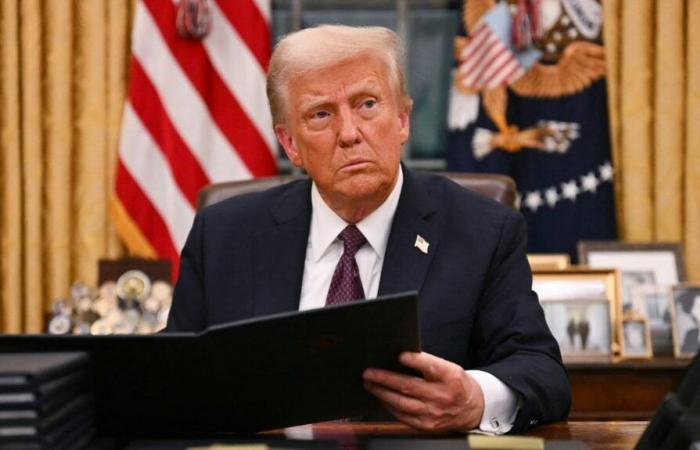
The American president initialed a text returning to the automatic acquisition of American citizenship for anyone born in the United States. However, this right is protected by the 14th Amendment to the Constitution.
Donald Trump has launched his offensive against migrants. The Republican president signed dozens of decrees on the first day of his mandate, Monday January 20, including a series of measures against immigration, both legal and illegal. One of the texts notably plans to abolish the right of soil, which grants American citizenship to anyone born on American territory. Franceinfo answers three questions about this decision, which has already been challenged in court.
1 What does the decree signed by Donald Trump provide?
The text signed by the Republican president specifies that the United States “will no longer automatically recognize the citizenship of children born in the United States to immigrant parents who entered the country illegally, if neither parent is an American citizen or holder of a green card”details the Washington Post. According to the American daily, the decree also removes automatic recognition of citizenship for all children born to foreign parents present in the United States with a temporary worker, student or tourist visa. This decision will apply to all births, starting one month after the signing of the decree.
Concretely, the new federal administration will no longer issue passports to people it deems ineligible for citizenship and will also refuse documents issued by federated states or local authorities which recognize this citizenship, continues the Washington Post. This decree therefore amounts to revoking land rights, a principle recognized and protected by the American Constitution for more than one hundred and fifty years.
2 Does the president have the power to abolish land law?
In the United States, land law is regulated, recalls NBC News, by the 14e amendment of the Constitution. The latter determines that “all persons born or naturalized in the United States, and who are therefore subject to the jurisdiction [américaine]are citizens of the United States.”. As pointed out by New York Timesthe American president does not have the power to modify the Constitution or the amendments made to this founding text alone.
The National Constitution Center specifies that amendments to the Constitution can be proposed by a two-thirds majority of Congress, or two-thirds of the 50 American states. The modifications to the Constitution must then be approved by a majority of three-quarters of the States, or 38 out of 50. Several associations for the defense of migrants and civil liberties therefore estimated, as of Monday, that the Republican president was exceeding his power by signing this decree.
In this document, Donald Trump, however, relies on a different interpretation of the 14e amendment. For him, the text does not apply to children born in the United States to parents who arrived in the country illegally.
“As with other decrees signed by Donald Trump, this one will be challenged in court and this could go all the way to the Supreme Court,” estime Lauric Henneton, lecturer at university from Versailles Saint-Quentin-en-Yvelines. The historian recalls that on the 14the amendment was adopted in 1868, at the end of the Civil War, “to guarantee slaves and their children access to citizenship”. For more than a century, American jurists have largely agreed that its formulation established the fundamental and universal character of land law.
“The current Supreme Court, with a conservative majority, is originalist: it opposes interpretations of the Constitution which go beyond the thinking of its authors. (…) However, the 14th Amendment does not concern questions of immigration.”
-Lauric Henneton, historianat franceinfo
As the non-partisan organization Brennan Center for Justice notes, the American Supreme Court has already reaffirmed the law of the soil in a decision rendered in 1898. At the time, the magistrates had ruled that a man born in California of Chinese parents did indeed have American citizenship, relying in particular on the 14e amendment. The Brennan Center for Justice also cites a 1982 decision, confirming that “illegal immigrants and their children benefit from all the protections provided for in 14e amendment”.
However, these precedents do not seem to be a concern for Donald Trump. Questioned on this subject by journalists on Monday, the Republican president acknowledged that his decree “might well” be contrary to the Constitution. “I think we have good arguments, but maybe you're right. We'll see.”declared the billionaire, quoted by the Washington Post.
“There is something performative about this first day in office: Donald Trump signed many measures, at the White House and in public [à la Capital One Arena]and that pleases his electorate”, deciphers Lauric Henneton. For the historian, this decree and the other anti-immigration measures adopted Monday also “a dissuasive purpose”. “This announcement effect, very ceremonial and massive, sends a symbolic message, insiste Lauric Henneton. Donald Trump wants to say: 'During this mandate, legal and illegal immigration will be much more complicated than under my predecessor'.”
3 What reactions did the text provoke?
The response to Donald Trump's decree was not long in coming. As Politico reports, the first legal challenges against the text were filed less than two hours after its signing. Migrant rights associations, including the powerful American Civil Liberties Union (ACLU), challenged the decree in a New Hampshire court on Monday evening. This complaint was filed “on behalf of a group representing Indonesian immigrants to this state, as well as other groups representing Latinos and Dreamers”a nickname given to undocumented immigrants who arrived in the United States as children.
“We will not stand by and do nothing in the face of this attack on America's newborns and future generations.” denounced ACLU executive director Anthony D. Romero in a statement. According to him, the measure is “so scandalous that we have no doubt that we will win”. Politico adds that similar appeals are expected in the states of Connecticut and California.
“Several states led by Democrats have set aside funds to have the means to resist Donald Trump on a legal level”underlines Lauric Henneton. This is particularly the case of California, which has already set aside $25 million to finance litigation against the new administration. “Donald Trump is more ready than in 2017 to pass his measures, but the Democrats are also better prepared to respond to them”, assure Lauric Henneton.





